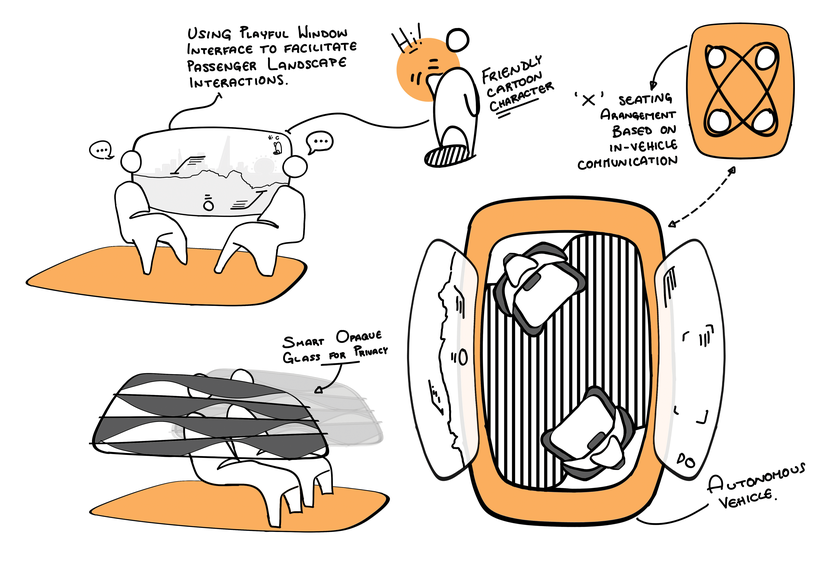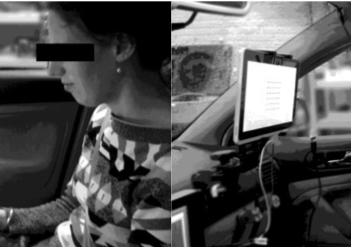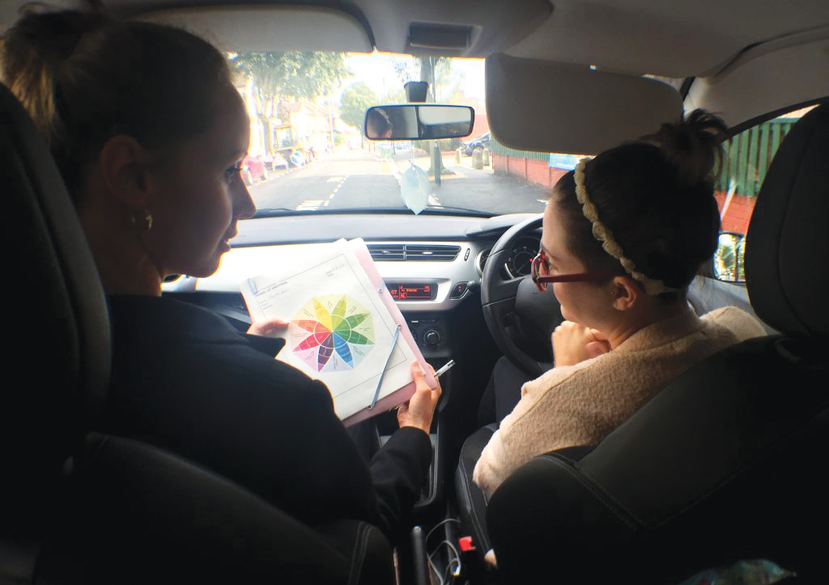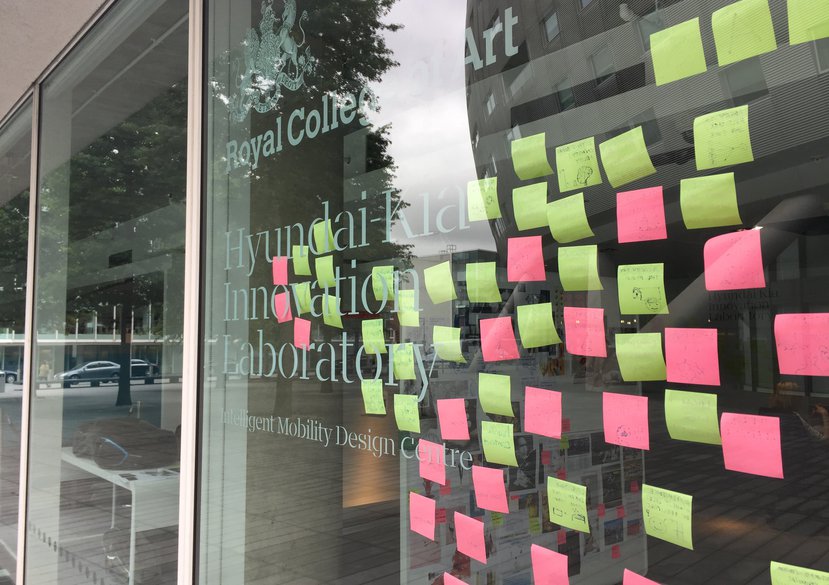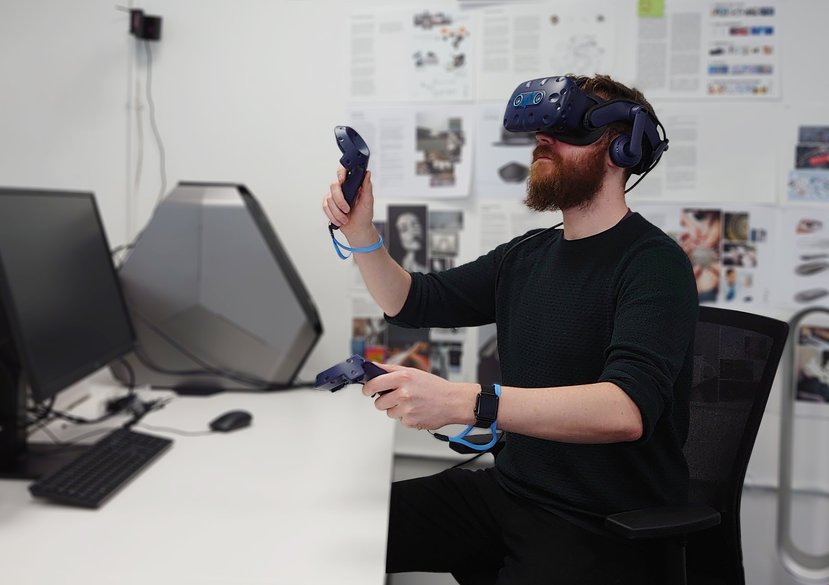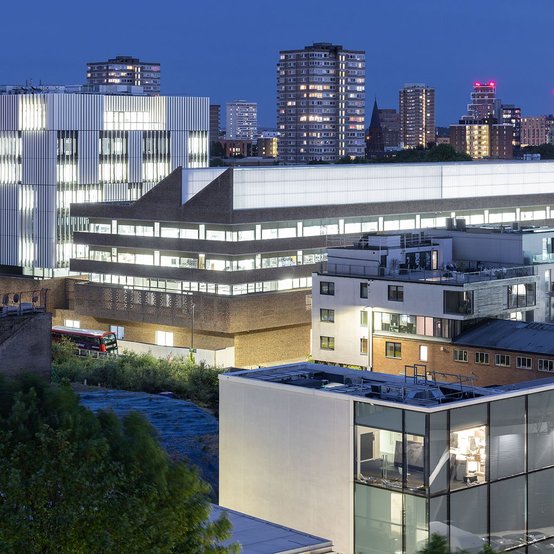
Overview
Creating desirable future mobility
Key details
- Full-time or part-time study
School or Centre
Location
- Battersea
Next open event
Round 1 application deadline
- 13 Jan 2025
Career opportunities
- PhD study leads to a range of opportunities. You might become a researcher in industry or government or an academic in an international institution. It is an opportunity for you to investigate a research question or issue in depth, enabling you to take a more reflective, more innovative role in design.
The Intelligent Mobility research programme explores novel vehicle types, services, and integrated city solutions.

Building on the RCA’s world-leading Intelligent Mobility MA programme, the Intelligent Mobility MPhil/PhD programme promotes critical and thoughtful research and design in the development of future mobility.
It provides a design-led disruptive research environment focusing on new ways of designing vehicles, experiences, spaces and infrastructure that address societal issues.
We welcome in particular proposals aligned to one or more of our Intelligent Mobility Design Centre studios, approaching mobility distinct yet complementary perspectives.
The Automotive Transitions Studio focus is on vehicle design, exploring the paradigm shifts in the car industry, its transition to sustainability and its connection with car design heritage, material culture, fashion, and people’s aspirations.
The People and Places Studio approaches mobility from an integrated systems perspective and explores future urban mobility services; the design of mobility environments, experiences and the development of mass transport within our urban and extended environments.
Finally, the Humanising Technology Studio focuses on user experience and human factors that have been formed and transformed through trends in new mobility solutions and technologies. Topics include the creation of meaningful experiences; understanding fears, hopes and aspirations; and designing for experiential changes in current and future mobility.
Programme details
- PhD: 3–4 years (full time), 6–7 years (part time)
- MPhil: 2–3 years (full time), 4–6 years (part time)
Catch the replays from our latest online Open Day.
Gallery
Staff
Facilities
The Intelligent Mobility Design Centre is located in the RCA's Rausing Research & Innovation Building in Battersea.
View all facilitiesThe building features a purpose-built facilities including workshop and presentation spaces, visualisation and mixed reality labs, as well as a prototyping workshop. Shared workspaces are provided for all research students. In addition, you have access to wood, metal, plastic and resin workshop facilities, as well as contemporary digital fabrication equipment and a suite of bookable project and making spaces.
More details on what you'll study.
Find out what you'll cover in this programme.
What you'll cover
What is a research degree?
At the RCA we offer both MPhil and PhD research degrees. Research candidates can study in part-time and full-time modes (subject to approval) and their research can be undertaken by project or thesis modes. The mode of research will be discussed in the interview, and should be indicated in the application process.
A postgraduate research degree challenges you to complete a research project that pushes the boundaries of our understanding.
Unlike a taught degree, a research degree emphasises independence of learning and increased specialisation. You will manage your own research project in order to investigate your topic in depth and to produce new ideas, arguments and solutions.
A research degree will give you the subject matter expertise and transferable skills necessary for a wide range of senior roles in research and academia, as well as in business, industry and the cultural and creative sectors.
A PhD is awarded to students who produce a substantial piece of original research that makes a contribution to research in the field. This can take the form of a thesis (60,000–80,000 words) or by project (a body of work and thesis 25,000–40,000 words). If you’re a PhD candidate you’ll normally register for three years full-time, with submission within four years, or six to seven years part-time. You must remain registered and pay an appropriate fee until submission.
An MPhil is awarded for original research and submission of a thesis. If you’re an MPhil candidate you’ll normally be registered for two to three years full-time or four to six years part-time.
Our postgraduate community
We have more than 250 PhD students pursuing cutting-edge research and undertaking advanced training across the College:
- School of Architecture
- School of Arts & Humanities
- School of Communication
- School of Design
- Computer Science Research Centre
- Helen Hamlyn Centre for Design
- Intelligent Mobility Design Centre
- Material Futures Research Centre
- Robotics Laboratory
The RCA is a world-leading postgraduate university and is ranked the most research-intensive university of art and design in the UK since 2014. Both our students and staff are drawn from countries across the globe. Overseas students play a vital role in ensuring that our College community benefits from a diversity of experience and skills.
Doctoral training programme
At the RCA, research students undertake training both at a cross-College level and within their Schools/Centres, offering rich and robust preparation and learning opportunities for their research degree progression. Many of these also offer opportunities to build a portfolio of experience for future careers.
All students are required to attend and engage with our Doctoral Training Weeks in September, February and July. These are opportunities to participate in the broader research community at the RCA, but also to undertake timely training to support research progression. These intensive weeks include a range of professional development seminars, training and advice in writing, getting published, achieving impact, entering the academic job market and more, and opportunities for you to develop and present your research to your peers and staff.
Our Research Biennale, held every alternate February, offers a showcase of research to internal and external partners and public. The events include space for testing and experimenting with public-facing aspects of research, extending and challenging frameworks and perceptions of what art and design research can be.
We are committed to ensuring that you are well equipped, not only to complete your studies but also to develop your future careers.
Supervisors
All students are allocated supervisors upon registration; your supervisory team will have both subject specialism and experience of supervising to completion. Our current staff index includes an overview of their research interests, recent research outputs and areas of expertise. These give an idea of the key areas of research that are covered at the RCA.
We are not able to guarantee allocation to a specific supervisor as we need to balance staff capacities and our research strategy. However, if there is a particular supervisor whose research aligns with your research proposal, please join us at one of our Open Days and we can talk with you about the possibilities.
Each student will have six supervisions per year (three for part-time students); these might be with the full supervisory team or with one supervisor. Students are expected to initiate these meetings, set the agenda and provide supervisors with pre-reading or other materials in an agreed timeframe for review.
Annual progress reviews
All research students have Annual Progress Reviews, which they must pass in order to progress into the next year of study. These are vital points where all candidates receive formal feedback not only from their supervisory team, but also from other members of the faculty.
There is a formal Confirmation Exam that takes place midway through the period of study to ascertain your readiness for PhD submission; if you do not meet the requirements at this stage then you’ll usually be recommended to submit for MPhil examination.
Requirements
What you need to know before you apply
The programme welcomes applications from candidates from across the world and of all ages, including those with academic and professional backgrounds.
Applications are considered in terms of quality of proposal, quality of practice (where appropriate), readiness to undertake a research degree at this level and supervisory capacity.
What's needed from you
Portfolio requirements
Please note this information relates to the 2024/25 academic year and may be updated for 2025/26 – more information will be available when applications open in October 2024.
Your portfolio is a showcase of your work as an artist or designer and can be made up of images, videos or writing examples. Your portfolio helps us to better understand your application and allows you to show evidence of your ability and motivation to undertake a given programme.
Generally, we’re looking for you to demonstrate your:
- Creativity, imagination and innovation
- Ability to articulate the intentions of the work
- Intellectual engagement in areas relevant to the work
- Technical skills appropriate to the work
- Potential to benefit from the programme
Please submit a portfolio with no more than 10 projects that illustrate your practices and capabilities supporting your research proposal (20mb PDF max). These can be drawn from a wide range of project types as some applications may come from diverse disciplines. When submitting group projects please describe your own role clearly.
In your recorded video, we would like to know about your background and motivation for applying for a research degree in the Research Centre: your expectations of the programme and supervision; how it will help develop your future interests and goals; research expertise area that you require; and the key capabilities, insights and experiences that you bring to the programme. Please also give a very brief ‘elevator pitch’ summary of your research proposal.
English-language requirements
If you are not a national of a majority English-speaking country, MPhil candidates will need the equivalent of an IELTS Academic score of 6.5 with a 6.5 in the Test of Written English (TWE). PhD candidates will need the equivalent of an IELTS Academic score of 7.0 with a 7.0 in the Test of Written English (TWE).
You are exempt from this requirement if you have received a 2.1 degree or above from a university in a majority English-speaking nation within the last five years.
If you need a Student Visa to study at the RCA, you will also need to meet the Home Office’s minimum requirements for entry clearance.
Fees & funding
For this programme
Fees for new students
Fees for September 2025 entry on this programme are outlined below. From 2021 onward, EU students are classified as Overseas for tuition fee purposes.
Home: High residency
Home: Low residency
Overseas and EU: High residency
Overseas and EU: Low residency
Deposit
New entrants to the College will be required to pay a non-refundable deposit in order to secure their place. This will be offset against the tuition fees for the first year of study.
Home
Overseas and EU
Progression discount
For alumni and students who have completed an MA, MA/MSc or MRes at the RCA within the past 10 years, a progression discount is available for Doctoral study. This discount is £1,000 per year for thee first three years of full-time study.
Continuation fees
Candidates who have completed the minimum three years of study (FT or 6 years PT) for PhD will be eligible to apply for Continuation Status. This is a period of study, for up to one academic year, during which a candidate will be focused upon revising and editing their thesis/project.
2024/25
Scholarships
RCA Scholarships
The RCA scholarship programme is growing, with hundreds of financial awards planned for the 2025/6 academic year.
For more information and examples of financial awards offered in 2024/25, visit the Scholarships & awards webpage.
You must hold an offer to study on an RCA programme in order to make a scholarship application in Spring 2025. A selection of RCA merit scholarships will also be awarded with programme offers.
We strongly recommend that you apply for your programme as early as possible to stand the best chance of receiving a scholarship. You do not apply directly for individual awards; instead, you will be invited to apply once you have received an offer.
More information
Additional fees
In addition to your programme fees, please be aware that you may incur other additional costs associated with your study during your time at RCA. Additional costs can include purchases and services (without limitation): costs related to the purchase of books, paints, textiles, wood, metal, plastics and/or other materials in connection with your programme, services related to the use of printing and photocopying, lasercutting, 3D printing and CNC. Costs related to attending compulsory field trips, joining student and sport societies, and your Convocation (graduation) ceremony.
If you wish to find out more about what type of additional costs you may incur while studying on your programme, please contact the Head of your Programme to discuss or ask at an online or in person Open Day.
We provide the RCASHOP online, and at our Kensington and Battersea Campuses – this is open to students and staff of the Royal College of Art only to provide paid for materials to support your studies.
We also provide support to our students who require financial assistance whilst studying, including a dedicated Materials Fund.
MPhil/PhD fee bands
The RCA is introducing two separate tuition fee bands for MPhil/PhD students with effect from the academic year 2023/24: Low Residency and High Residency. For more information about what the different fee bands entail, and for frequently asked questions on fee bands, visit:
External funding
With the Government's introduction of the new Doctoral Loan and the continued support available via the Arts and Humanities Research Council, there are more financial support options than ever before.
Payments
Tuition fees are due on the first day of the academic year and students are sent an invoice prior to beginning their studies. Payments can be made in advance, on registration or in two instalments.
Start your application
Change your life and be here in 2025. Applications now open.
The Royal College of Art welcomes applicants from all over the world.
Before you begin
Make sure you've read and understood the entrance requirements
More information about entrance requirementsCheck you have all the information you need to apply.
Read our application process guideConsider attending an Open Day, or one of our portfolio or application advice sessions
See upcoming sessionsPlease note, all applications must be submitted by 12 noon on the given deadline.
Ask a question
Get in touch if you’d like to find out more or have any questions.
[email protected]

